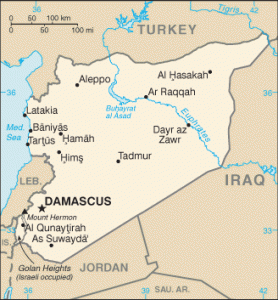The United Nations human rights chief warned on Monday that arms supplies to both the Syrian government and the rebel militias were deepening the conflict and hindering the efficacy of the new plan for a unity government.
 UN official Navi Pillay condemned the continued flow of weapons from foreign powers to both sides in the Syrian conflict. “The ongoing provision of arms to the Syrian government and to its opponents feeds additional violence,” she said in the text of remarks made to the Security Council. “Any further militarization of the conflict must be avoided at all costs.”
UN official Navi Pillay condemned the continued flow of weapons from foreign powers to both sides in the Syrian conflict. “The ongoing provision of arms to the Syrian government and to its opponents feeds additional violence,” she said in the text of remarks made to the Security Council. “Any further militarization of the conflict must be avoided at all costs.”
Foreign meddling on behalf of all sides has been instrumental in prolonging the conflict by emboldening both sides and making a political settlement more remote. While Russia and Iran continue to support the regime of Syrian President Bashar al-Assad, the US and its allies in Europe and the Persian Gulf states continue to aid and weaponize the Syrian rebels.
The support has continued even though outside powers are well aware that both sides in the conflict have committed serious atrocities and human rights abuses and despite the fact that experts have repeatedly said such policies are worsening the conflict.
James Dobbins, director of the RAND International Security and Defense Policy Center and a former US assistant secretary of state told NPR recently, “the external environment in which sides are providing arms to both of the contending parties—all of that suggests that the situation’s going to continue to deteriorate.”
In a meeting called by UN envoy to Syria Kofi Annan, world powers agreed on a plan for a political transition in Syria in a meeting in Geneva on Saturday called by UN envoy Kofi Annan. A unity government will be formed according to a democratic process and can include members of the present regime as well as opposition.
What was missing from the new Annan plan was any demand for outside powers to quit aiding either side in Syria. Indeed, a legitimate political transition would be impossible to realize with Russia continuing to prop up the Assad regime and with the US and its allies continuing to aid the rebel militias in a bid to “[pursue] regime change by civil war in Syria,” as Joshua Landis of the Center for Middle East Studies at the University of Oklahoma has described it.


